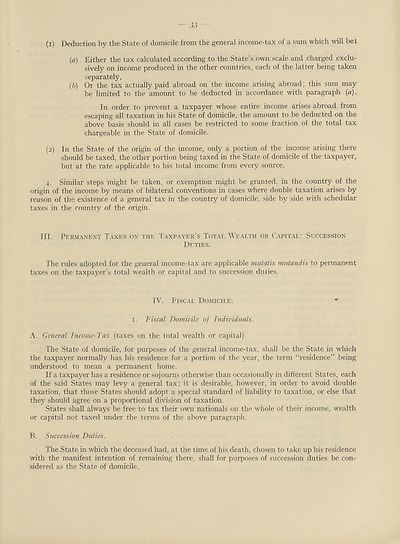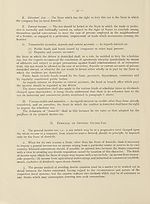Download files
Complete book:
Individual page:
Thumbnail gallery: Grid view | List view

33 —
(1) Deduction by the State of domicile from the general income-tax of a sum which will bet
(a) Either the tax calculated according to the State's own scale and charged exclu¬
sively on income produced in the other countries, each of the latter being taken
separately,
(b) Or the tax actually paid abroad on the income arising abroad; this sum may
be limited to the amount to be deducted in accordance with paragraph (a).
In order to prevent a taxpayer whose entire income arises abroad from
escaping all taxation in his State of domicile, the amount to be deducted on the
above basis should in all cases be restricted to some fraction of the total tax
chargeable in the State of domicile.
(2) In the State of the origin of the income, only a portion of the income arising there
should be taxed, the other portion being taxed in the State of domicile of the taxpayer^
but at the rate applicable to his total income from every source.
4. Similar steps might be taken, or exemption might be granted, in the country of the
origin of the income by means of bilateral conventions in cases where double taxation arises by
reason of the existence of a general tax in the country of domicile, side by side with schedular
taxes in the country of the origin.
III. Permanent Taxes on the Taxpayer’s Total Wealth or Capital: Succession
Duties.
The rules adopted for the general income-tax are applicable mutatis mutandis to permanent
taxes on the taxpayer’s total wealth or capital and to succession duties.
IV. Fiscal Domicile.
1. Fiscal Domicile oi Individuals.
A. General Income-Tax (taxes on the total wealth or capital).
The State of domicile, for purposes of the general income-tax, shall be the State in which
the taxpayer normally has his residence for a portion of the year, the term "residence” being
understood to mean a permanent home.
If a taxpayer has a residence or sojourns otherwise than occasionally in different States, each
of the said States may levy a general tax; it is desirable, however, in order to avoid double
taxation, that those States should adopt a special standard of liability to taxation, or else that
they should agree on a proportional division of taxation.
States shall always be free to tax their own nationals on the whole of their income, wealth
or capital not taxed under the terms of the above paragraph.
B. Succession Duties.
The State in which the deceased had, at the time of his death, chosen to take up his residence
with the manifest intention of remaining there, shall for purposes of succession duties be con¬
sidered as the State of domicile.
(1) Deduction by the State of domicile from the general income-tax of a sum which will bet
(a) Either the tax calculated according to the State's own scale and charged exclu¬
sively on income produced in the other countries, each of the latter being taken
separately,
(b) Or the tax actually paid abroad on the income arising abroad; this sum may
be limited to the amount to be deducted in accordance with paragraph (a).
In order to prevent a taxpayer whose entire income arises abroad from
escaping all taxation in his State of domicile, the amount to be deducted on the
above basis should in all cases be restricted to some fraction of the total tax
chargeable in the State of domicile.
(2) In the State of the origin of the income, only a portion of the income arising there
should be taxed, the other portion being taxed in the State of domicile of the taxpayer^
but at the rate applicable to his total income from every source.
4. Similar steps might be taken, or exemption might be granted, in the country of the
origin of the income by means of bilateral conventions in cases where double taxation arises by
reason of the existence of a general tax in the country of domicile, side by side with schedular
taxes in the country of the origin.
III. Permanent Taxes on the Taxpayer’s Total Wealth or Capital: Succession
Duties.
The rules adopted for the general income-tax are applicable mutatis mutandis to permanent
taxes on the taxpayer’s total wealth or capital and to succession duties.
IV. Fiscal Domicile.
1. Fiscal Domicile oi Individuals.
A. General Income-Tax (taxes on the total wealth or capital).
The State of domicile, for purposes of the general income-tax, shall be the State in which
the taxpayer normally has his residence for a portion of the year, the term "residence” being
understood to mean a permanent home.
If a taxpayer has a residence or sojourns otherwise than occasionally in different States, each
of the said States may levy a general tax; it is desirable, however, in order to avoid double
taxation, that those States should adopt a special standard of liability to taxation, or else that
they should agree on a proportional division of taxation.
States shall always be free to tax their own nationals on the whole of their income, wealth
or capital not taxed under the terms of the above paragraph.
B. Succession Duties.
The State in which the deceased had, at the time of his death, chosen to take up his residence
with the manifest intention of remaining there, shall for purposes of succession duties be con¬
sidered as the State of domicile.
Set display mode to:
![]() Universal Viewer |
Universal Viewer | ![]() Mirador |
Large image | Transcription
Mirador |
Large image | Transcription
Images and transcriptions on this page, including medium image downloads, may be used under the Creative Commons Attribution 4.0 International Licence unless otherwise stated. ![]()
| League of Nations > Economic and financial section > Double taxation and tax evasion > (39) |
|---|
| Permanent URL | https://digital.nls.uk/190911815 |
|---|
| Shelfmark | LN.II |
|---|
| Description | Over 1,200 documents from the non-political organs of the League of Nations that dealt with health, disarmament, economic and financial matters for the duration of the League (1919-1945). Also online are statistical bulletins, essential facts, and an overview of the League by the first Secretary General, Sir Eric Drummond. These items are part of the Official Publications collection at the National Library of Scotland. |
|---|---|
| Additional NLS resources: |
|

